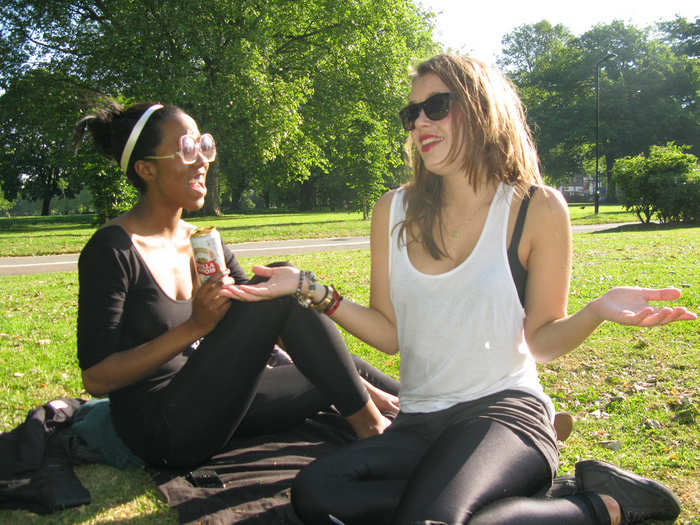25 things that make you happier
Write down 3 things you're grateful for.

Go on a hike or gaze up at the stars on a clear night.

Awe is a powerful — even awesome, you might say — human emotion. And a handful of recent studies have found a link between experiencing a sense of awe — that feeling you get when you look up at a starry sky or out across a wide open valley — with feeling less stressed and more satisfied.
People who've recently had an awe-inspiring experience are also more likely to say they feel more curious about the world around them and to act more generously toward others.
Move to Switzerland.

Ok, moving to Switzerland might not make you happy, but people who live there are some of the happiest in the world, according to the 2015 World Happiness Report, a ranking compiled by an international team of economists, neuroscientists, and statisticians to measure global well-being.
One of the report's key findings, based on decades of neuroscientific and psychological research, suggests that keeping the brain happy relies on 4 main factors, which include staying positive, recovering from negative feelings, spending time with loved ones, and being mindful.
"These findings highlight the view that happiness and well-being are best regarded as skills that can be enhanced through training," the researchers write in their report.
Drink coffee (not too much, though).

They don't call it "Central Perk" for nothing. As a central nervous system stimulant, caffeine doesn’t just boost alertness, it can also improve your mood.
Several studies have even found a connection between caffeine consumption and a reduced depression risk, as well as an even a lower risk of suicide. However, at least one of these studies specifically found this connection with caffeinated coffee but not tea, though others found the same effect for tea as well.
Meditate.

You don't have to be Don Draper to reap the benefits of some peace and quiet.
Multiple studies suggest that meditating — focusing intently and quietly on the present for set periods of time — can help lessen feelings of depression and anxiety. Research in long term meditators — Buddhist monks, for example — shows that these peoples’ brains have well-developed areas that could be linked to heightened awareness and emotional control. While it's possible that people with such brains might be more likely to meditate in the first place, other studies do show that people who complete a meditation program tend to show brain changes linked with self-awareness, perspective, and memory.
Read an adventure story.

You may be able to get the benefits of an awe-inspiring experience just by reading about someone else’s. A small 2012 study found that even when people simply read about someone else’s awe-inspiring experience, they were more satisfied, less stressed, and more willing to volunteer their time to help others compared with people who were simply shown something that made them feel happy.
Get outside.

Stressed out? Head for a forest. One study found that a group of students sent into the trees for two nights had lower levels of cortisol — a hormone often used as a marker for stress — than those who spent the same two nights in a city.
In another study, researchers found a decrease in both heart rate and cortisol levels in people in the forest when compared to those in urban areas. "Stressful states can be relieved by forest therapy," the researchers wrote in their paper.
Go for a nature walk.

If living in a big city has you feeling a bit down, there's good news: A brief walk in nature could be all it takes to chase away those negative thoughts.
At least that's the finding of a new study published last month.
In the study, a group of 38 Northern Californians (18 women and 20 men) were split up into two groups — one who took a 90-minute walk in nature and another that did the same walk in the city. The nature walkers reported having fewer negative thoughts about themselves after the walk than before the walk, while the urban walkers reported no change.
What's more, fMRI brain scans revealed less activity in the subgenual prefrontal cortex (sgPFC), a brain region that may play a key role in some mood disorders and has been linked with patterns of negative thought, according to the study. Those who went on the urban walk did not show any of these benefits, the study found.
Do things you do when you’re happy — even if you’re not.

Experiencing positive emotions not only appear to have the power to neutralize negative ones, but can also encourage people to be more proactive. “Positive emotions may aid those feeling trapped or helpless in the midst of negative moods, thoughts, or behaviors — for example, grief, pessimism, or isolation — spurring them to take positive action,” write a team of UC Riverside psychologists in a recent paper summarizing these findings.
Participate in cultural activities.

Visiting a museum or seeing a concert is yet another way to boost your mood. A study that examined the anxiety, depression, and life satisfaction of over 50,000 adults in Norway offered an interesting link: People who participated in more cultural activities, like attending a play or joining a club, reported lower levels of anxiety and depression as well as a higher satisfaction with their overall quality of life. So get out there and participate!
Listen to sad songs.

Happiness is entirely subjective, meaning that what makes one person happy might affect someone else differently. However, listening to sad music seems to be a common activity that's been linked with increased happiness around the globe.
In a study that looked at 772 people on the eastern and western hemispheres, researchers found that listening to sad music generated “beneficial emotional effects such as regulating negative emotion and mood as well as consolation,” the researchers write in their paper.
Set specific goals you know you can achieve.

If you’re one of those people who like to make to-do lists on a regular basis, then listen closely: When you’re setting your goals, it’s better to be specific and set goals you know you can achieve. For example, instead of setting a goal like "save the environment," try to recycle more.
Those two examples were tested on a group of 127 volunteers in a study published last year. The first group were provided a series of specific goals like “increase recycling” while the second group had broader goals like “save the environment." Even though the second group completed the same tasks as the first group, the people in the second group reported feeling less satisfied with themselves than the first group. The people in the second group also reported a lower overall sense of personal happiness from completing their goal, the scientists report.
Write down your feelings.

Ever heard someone say, 'If you're angry at someone, write them a letter and don't send it'? While that might seem like a waste of time, science reveals recording your feelings is great for clarifying your thoughts, solving problems more efficiently, relieving stress, and more. A team of pyschologists recently hit on a neurological reason behind why this simple act might help us overcome some emotional distress.
The researchers studied brain scans of volunteers who recorded an emotional experience for 20 minutes a day for 4 sessions. They then compared the brain scans with volunteers who wrote down a neutral experience for the same amount of time. The brain scans of the first group showed neural activity in a part of the brain responsible for dampening strong emotional feelings, suggesting that the act of recording their experience calmed them. This same neural activity was absent in the volunteers who recorded a neutral experience.
Spend money on others, not yourself.

When you’ve had a really bad day, you might have the urge to go and buy your favorite comfort food or finally purchase that pair of shoes you’ve been eyeing for the last three months. However, research shows that you’ll feel happier if you spend that money on someone else instead of yourself.
Case in point: A 2008 study gave 46 volunteers an envelope with money in it wherein half were instructed to spend the money on themselves and the other half put the money towards a charitable donation or gift for someone they knew. The volunteers recorded their happiness level before receiving the envelope and after spending the money by the end of that same day.
Sure enough, the researchers discovered that those who spent their money on others had a higher level of happiness than those who spent the money on themselves.
Volunteer.

It might sound counterintuitive, but one of the main ways you can care for yourself is to care for others.
In a recent review of 40 studies done over the last 20 years, researchers found that one activity was far more important than the rest for boosting psychological health: volunteering. This activity, the researchers reported, had been found in many volunteers to be linked with a reduced risk of depression, a higher amount of overall satisfaction, and even a reduced risk of death from of a physical illness as a consequence of mental distress.
Make time for friends.

Spending time with friends may promote greater happiness than spending time with family, at least according to a recent study.
For the study, researchers used an app called the Mappiness app to determine how much happier people were when they were with their friends, parents, and children.
The app sent alerts asking people how happy they felt — on an 11-point scale from “not at all” to “extremely” — throughout the day. By analyzing over 3 million submissions from more than 50,000 volunteers, the researchers discovered that people experienced, on average, an 8% increase in happiness when they were with friends, compared with a 1.4% increase with parents, and just a 0.7% increase when they were with their children.
Smile more.

It might come as no surprise that smiling can make you feel happier. But the important thing here is that the smile must be sincere, it can’t be faked. If you fake it, you might even make yourself more unhappy, according to a 2011 study.
The study examined a group of city bus drivers over a period of two weeks. They found that employees who put on a fake smile for the job were in a worse mood by the end of the day compared to when their shift began. But drivers who genuinely smiles as a result of positive thoughts actually had a better mood by the end of the day. So when you smile, make sure to smile like you mean it!
Don’t hold a grudge.

It’s one thing to get upset over an injustice you suffered at the hands of someone else, but it’s another thing entirely to hold on to that emotion long-term. That’s called holding a grudge and it can easily consume you if you’re not careful.
The reason this is so bad for your happiness is because the negative emotions associated with grudges eventually give way to resentment and thoughts of revenge. In turn, this leaves little room in your emotional repertoire for anything else, like happiness, according to the Mayo Clinic. What’s more, decades of research have linked this simple act to better overall heart health, less psychological stress, improved physical ability, and longer life.
That’s why it’s always better to forgive and move on than hold on to a grudge.
Have the right amount of sex.

If you have a good memory, you might recall a certain study in 2004 that said increasing your amount of intercourse from once a month to once a week would give you the same amount of happiness as receiving an extra $50,000 in the bank!
But beware: more sex doesn’t necessarily mean more happiness, according to a report published this year. The researchers of the latest study found that couples who had more sex because they were asked to for the study reported that the sex was not enjoyable and did not make them happier.
Therefore, sex will only lead to happiness when the couple is having it for a meaningful reason, the researchers conclude. So, whether it’s once a week or once a month, the frequency is less important than the purpose behind the act.
Be both an optimist and a realist.

People who have the positive attitude of optimists paired with the rational outlook of realists tend to be more successful and happy, according to psychologist Sophia Chou.
That's because so-called "realistic optimists" have the perfect blend of personality types to succeed. Unlike idealists, they are willing to face challenging situations with a clear view of reality, but will use creativity and a positive outlook to try to work their way out of the problem.
Get your hands dirty.

Breathing in the smell of dirt may lift your spirits, according to a study which found that a bacteria commonly found in soil produces effects similar to antidepressant drugs.
The harmless bacteria, Mycobacterium vaccae, stimulated the release of serotonin in the brain after it was injected into mice. Low levels of serotonin is what causes depression in people.
In a human test, cancer patients reported increases in their quality of life when they were treated with the bacteria.
The findings "leave us wondering if we shouldn’t all be spending more time playing in the dirt,” lead author Chris Lowry of the University of Bristol in England said in a statement.
Eat lunch on the beach.

Eating lunch at your desk can be a real downer, report scientists from the University of Sussex who measured the happiness of employees after they ate lunch in different locations.
The results showed that workers were happiest about their work when they ate lunch on the beach and least happy about work when they ate at their desk.
Getting outside in the sun was key to staving off misery — people who ate in parks had a more positive attitude about their jobs than those who chowed down at a restaurant or at home.
Work out.

Exercise is proven to increase feel-good chemicals in the brain, reduce stress hormones, and relieve depression and anxiety according to Happify, a website and app that offers psychology-based games to increase your happiness.
And you can achieve these positive changes in just a few short minutes. Researchers at the University of Vermont found that even just 20 minutes of exercise can give you those mood-boosting benefits for up to 12 hours afterward! Moreover, people who are active are happier and more satisfied with their lives.
The duration and location of your workout also affects how happy you feel afterward. So, check out how to achieve your maximum happiness sweet spot.
Master a skill.

Working hard to improve a skill or ability, such as learning how to drive or solving a math problem, may increase stress in the short-term, but makes people feel happy and more content with their lives in the long run, a 2009 study reported.
"People often give up their goals because they are stressful, but we found that there is benefit at the end of the day from learning to do something well. And what's striking is that you don't have to reach your goal to see the benefits to your happiness and well-being," co-author Ryan Howell said in a statement.
Be patient. Happiness tends to grow with age.

When it comes to happiness, older people seem to know something that the rest of us don't because a number of studies have found that older people tend to be some of the happiest people around.
Why this is, however, is still a mystery to scientists because they have yet to find what exactly is causing this happiness. Chances are, it's a number of things: One study in 2013 suggested the reason is because older people are more experienced, and therefore, better at dealing with negative emotions like anger and anxiety. But another, more recent study, reported that the cause is that older people are more trusting, which comes with a number of healthy psychological benefits that lead to happiness.
Whatever the reason, if you're not happy right now, you can rest assured that your chances of happiness in the future are good.
Popular Right Now
Popular Keywords
Advertisement